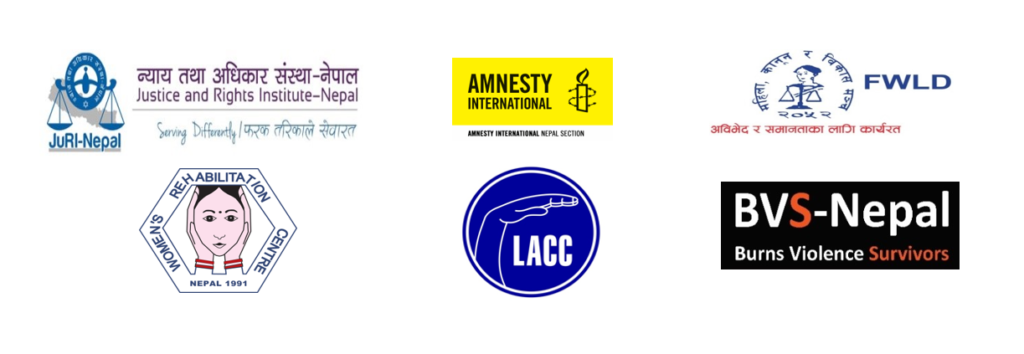
Join Press Statement
Kathmandu, 30 September 2020
On 28 September, President Bidhya Devi Bhandari signed into law two ordinances passed by the Council of Ministers aimed at curbing acid violence in the country. The new legislation has adopted heavier punishment for perpetrators of acid violence and introduced some regulatory measures for sale and distribution of acid and other corrosive materials.
As a group of civil society organizations who have long been campaigning on the issue, we welcome this development and take it as a sign that the government has paid heed to voices of survivors and others demanding changes in the law in order to better address acid violence.
“Today is a good day, particularly for the survivors of acid violence, who have been leading the fight for amendment to the acid violence law from the very beginning. It is due to their tireless advocacy that led the government to take this issue seriously and act upon it. Now, we need to ensure that these laws are effectively enforced,” said Nirajan Thapalia, Director of Amnesty International Nepal.
As per the new laws which came into effect on Monday, the maximum jail term for perpetrators of acid violence has been increased from eight years to 20 years and fine up to one million rupees. The ordinance has also amended the Evidence Act 2031 to widen the definition of what can be considered evidence. Similarly, it has also made it mandatory for sellers of acid and other corrosive materials to obtain a license and to sell to only adults above the age of 18.
While these are all positive changes, where the ordinances have failed is in retaining the provision of sentencing based on the body part where injuries were sustained. This shows that the law has failed to consider in depth the experiences of survivors.
“The provision of sentencing based on the body part injured; handing out heavier punishments in cases of damage to the face and less punishment if the damage is on only one side of the eye or ear isn’t justice friendly,” said Sabin Shrestha, Executive Director for Forum for Women, Law and Development, adding, “It would have been even more impactful had the ordinance brought a new law against acid violence rather than just amending current provisions and Acts.”
“Even though the new ordinances have helped to address the demands of acid violence survivors to a certain extent, the government should also focus on steps to prevent acid violence crimes from occurring,” said Mohan Lal Acharya, Executive Director of JuRI-Nepal.
The new ordinances have also failed to address incidents of burn violence caused using kerosene, petrol and other inflammable substance.
“The law needs to address the issue of burn violence which is a heinous crime just like acid violence. The physical pain, the mental trauma, the treatment process, the impact on self-respect and self-confidence suffered by acid violence and burn violence survivors are similar in nature. Failure of the law to address the issue of burn violence may suggest that there exists discrimination even between survivors of similar crimes,” said Pratiksha Giri, Executive Director of Burn Survivors Nepal.
Two weeks ago, a delegation of six civil society organizations including Amnesty International Nepal; Burn Violence Survivors Nepal; Forum for Women, Law and Development (FWLD); Justice and Rights Institute Nepal (JuRI-Nepal); Legal Aid and Consultancy Center (LACC) Nepal; and Women’s Rehabilitation Center (WOREC) met with Law and Justice Minister, Shivamaya Tumbahangphe and submitted a set of recommendations on the new legislation.
Recommendations included calls for strict punishment, free treatment and adequate compensation to survivors, provision of social safety allowances, education and employment opportunities, counselling for both victims and perpetrators, regulation of sale and distribution of acids and other toxic substances and creation of awareness programs for young people.
“The changes brought by the ordinances in respect to widening the scope of punishment of perpetrators, adding provision for treatment of survivors and prioritizing such cases in the court are all welcome. However, unless there are additional provisions that offer financial and social protection to address the psychosocial impact on survivors, these changes will not be fully effective,” said Lubha Raj Neupane, Executive Director of WOREC Nepal.
“I would also like to draw the attention towards treatment of past survivors and the need to establish a burns unit in every hospital,” said Anita Neupane Thapaliya, Executive Chair of Legal Aid and Consultancy Centre Nepal.

